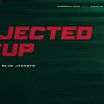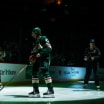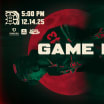Tom Kurvers, the Assistant General Manager for the Minnesota Wild, passed away Monday morning after a 2 1/2 year battle with lung cancer. He was 58 years old. But Kurvers was so much more than just the Wild's Assistant GM, or a cancer crusader, just like he was always more than just a quality NHL defenseman.
First and foremost, Kurvers was the father of four children, including daughters Madison and Rose and sons Weston and Roman. He was the husband of Heather.
Kurvers' loss is one shared by the State of Hockey
Bloomington native and UMD standout was proud of his Minnesota roots until the very end
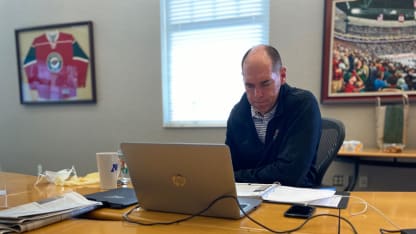
© Dan Myers
By
Dan Myers
Wild.com
Kurvers has long been admired for his gregarious, down-to-earth personality and friendly nature.
"I always thought if my sons grew up to be like Tom Kurvers, I would be a successful dad," his college coach, Mike Sertich, once told the Duluth News Tribune. "He meant that much to me as a player on our team."
That showed in the weeks, months and years following Kurvers' cancer diagnosis in January of 2019.
As word of his diagnosis spread, Kurvers relayed stories of countless e-mails, text messages and notes from complete strangers, fans, old friends and teammates, offering support in any way they could. He was immensely proud of his status as a native son of the State of Hockey.
"This guy was the goalie on my first squirt team," Kurvers said, reaching for a Post-It note on his desk during an interview with Wild.com in August of 2019. "I haven't talked to him since, probably high school. But that's what has happened. Guys from my squirt team, my high school team, my college team, guys I played on different pro teams to guys I've worked with on different NHL teams.
"It's consistent, and they care. The steady contact from people ... it has been strength for me."
Despite the ominous diagnosis, Kurvers attacked it like he did during his playing days: head on. The early results seemed promising, as scans three months after the diagnosis revealed shrinking tumors and a disease in retreat.
Eight weeks later, the results weren't nearly as positive, but they weren't negative either.
"But in this game," Kurvers would say, "a win is a win and a tie is a win.
"I will have to fight it every day; I know it will be with me at the end."
Perhaps more astutely, Kurvers acknowledged the affect the disease had on his soul and the positive changes he was able to make within his own life and the way he approached it.
"I'm quicker to let someone know that I'm thinking about them," Kurvers once said. "And I'm more ready to act on those thoughts than I used to."
Kurvers' loss is one that will be shared far beyond his family and the Wild organization.
"From Minnesota high school standout, to Hobey Baker Award winner and Stanley Cup champion, Tom's passion for and success in hockey could only be surpassed by the love and optimism he shared with family and friends each and every day," the Wild said in a statement on Monday. "Tom's kindness and enthusiasm will be greatly missed by the countless number of people on whom he had a positive influence throughout his life. We join the State of Hockey in mourning the loss a great hockey player and an even better person.
"Rest in peace TK."
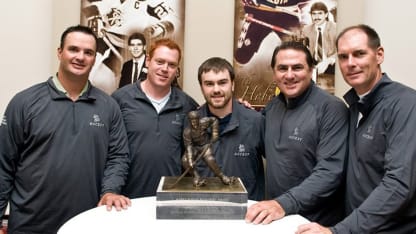
© UMD Bulldogs
Kurvers had an inauspicious start as a hockey player.
By today's standards, Kurvers was a late bloomer, not playing on his first hockey team until he was nine years old. His baseball coach, Dick Wineberg, was a bantam hockey coach when the high school program at Bloomington Jefferson began in 1971. Wineberg saw an athlete and convinced Kurvers to start playing the sport.
"I played a whole year of squirt hockey and didn't score a goal," Kurvers once said. "Only kid who didn't score. I was the last player on the team. There's a lot of stories out there about being the last player cut, I was the last player to make that team.
"And then the game kind of takes over your life."
Needless to say, Coach Wineberg was right.
The Hobey Baker Award winner in 1984 as a standout with the University of Minnesota Duluth, Kurvers was born in Minneapolis but grew up in Bloomington. He'd eventually help lead the Jaguars to their first-ever Minnesota State High School League state tournament appearance as a senior in 1980.
One of the top defensemen in the state, Kurvers' Jaguars made it to the state semifinals that year, but would go on to become one of Minnesota's most storied prep programs in the years that followed.
"Those players were friends of my younger brother [Mike]," Kurvers once said. "I knew the names of those guys in the mid- to late-80s. Those were the guys that were the guts of those teams that won those championships in a row and they were an awesome team.
"I feel pride in having known who those kids were and now you see things about who was the best team ever, and those kids are mentioned. I get a piece of it that really doesn't belong because my name is connected to Jefferson hockey. We did our part, but it got better after I left."
Kurvers himself would go on to UMD, where he would play four seasons, capping his collegiate career with the NCAA's highest individual honor, becoming the first Bulldog to win the Hobey Baker Award.
Five have followed in the nearly four decades since, as Minnesota Duluth boasts more winners of the award than any other school.
Following his freshman season in Duluth, Kurvers was drafted by the Montreal Canadiens with the 145th overall pick in the 1981 NHL Draft. Upon the conclusion of his college career, Kurvers stepped right into the Canadiens' lineup the following season, skating in 75 games with Montreal during the 1984-85 campaign, scoring 10 goals and assisting on 35 others.
Kurvers would go onto skate in 659 NHL games over the course of an 11-year career, playing with Montreal, Buffalo, New Jersey, Toronto, Vancouver, the New York Islanders and the Mighty Ducks of Anaheim, winning a Stanley Cup with the Canadiens in 1986.
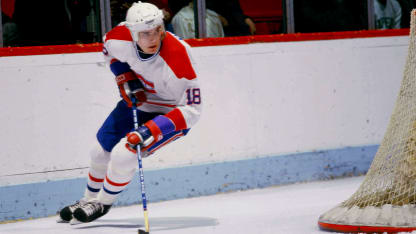
© Getty
But Kurvers' career in hockey was far from over once his playing days were done.
He served 11 years in various roles with the Phoenix/Arizona Coyotes, working as a scout, an assistant coach, the team's director of player personnel and even as an analyst for the club's radio broadcasts.
Kurvers moved to the Tampa Bay Lightning in 2008 and was that club's assistant GM and interim general manager before becoming the Lightning's Senior Advisor in 2011.
When his friend, Paul Fenton, became GM of the Wild in 2018, Kurvers returned to the State of Hockey to become his right-hand man, while also serving as GM of the team's American Hockey League affiliate in Iowa, a job he's held for the past three years.
Six months after his hiring by the Wild, Kurvers was diagnosed with lung cancer, a shocking development for a man that was never a smoker, was a former professional athlete and was in great physical shape long after his playing days were done.
"It's a terrible stigma that is attached to lung cancer," Kurvers once said. "Lung cancer kills more people than breast, colon and prostate cancers combined. It has a stigma of being a smoker's cancer, but 50 percent of the people who are diagnosed are not smokers."
After his diagnosis, Kurvers took part in two 'A Breath of Hope Lung Run/Walk' events in the Twin Cities, in an effort to raise money and awareness for an organization whose mission is to raise lung cancer awareness, provide patient and family support and fund innovative lung cancer research.
"I had been in contact with a friend of my daughter who works at the Breath of Hope Foundation," Kurvers said. "They had a 10K on the calendar, and I didn't really consider running in it, but I was going to speak at it."
Not an avid runner by any means, Kurvers was inspired by another former assistant GM in the League, current Florida Panthers General Manager Bill Zito, who rode his bike 100 miles in the Pelotonia bike ride in honor of his wife, Julie, who was diagnosed with breast cancer in May of 2019.
"When I saw Billy was going to ride 100 miles, I said, 'Hell, I can run a 10K,'" Kurvers said before the 2019 event.
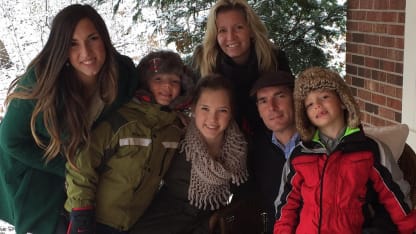
With the help of his vast network of former teammates, coaches and friends in the game, Kurvers raised tens of thousands of dollars for the foundation each of the past two years, running remotely last summer during the COVID-19 pandemic.
"Times have changed, and it's a different format," Kurvers said at the time. "But it's the same objective, and that's to raise awareness for lung cancer and to support the efforts to do more research and to provide services for people that are in need and are fighting lung cancer.
"There's a community of people who are in the same battle, and it's really tied together by the A Breath of Hope Foundation. They do as much as they can to help foster that community. It really is a tight-knit group of people doing extraordinary work and I'm proud to be connected to them and to help them, because they helped me.
"The fundraising efforts have a chance to save my life and so many others, so it's important to me and important to my family."
Later in his life, it were the times he and his family would spend preparing for those runs, and then together on race day, that Kurvers said he would cherish, bringing together his blended family - his older daughters from his first marriage, and his two sons with Heather.
"It's not often any more that we can all get together for a day, not as often as I'd like it to," Kurvers once said. "This is four or five hours together that we can always remember."


